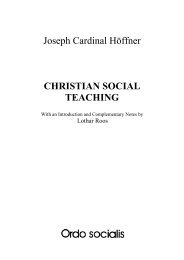Prof. Franz Josef Stegmann Bethlehem Social ... - Ordo Socialis
Prof. Franz Josef Stegmann Bethlehem Social ... - Ordo Socialis
Prof. Franz Josef Stegmann Bethlehem Social ... - Ordo Socialis
Create successful ePaper yourself
Turn your PDF publications into a flip-book with our unique Google optimized e-Paper software.
<strong>Stegmann</strong><br />
its competitors, the enterprise will become bankrupt and will be eliminated by the market.<br />
Competition and morality are consequently thought to exclude each other.<br />
From this fact two famous figures - Karl Marx and Friedrich August von Hayek (who<br />
received the 1974 Nobel Prize for economics) - drew contrasting conclusions. Karl Marx<br />
demanded for the sake of social justice and morality the elimination of economic competition<br />
as fully as possible.<br />
By contrast, von Hayek (who lectured in economics in the United States for many years)<br />
considered the concept of <strong>Social</strong> Market Economy to be a contradiction in itself, a "wooden<br />
iron", and rejected its social dimension in favour of market efficiency. He therefore gave the<br />
second volume of his main work Legislation and Liberty the title "The illusion of social<br />
justice". 80 Thus, morality and competition, market economy and social justice seem to<br />
exclude each other.<br />
2. RESOLVING THE CONFLICT BETWEEN COMPETITION AND MORALITY BY THE FRAMEWORK<br />
Whenever the expenses an enterprise has to bear exceed the expenses of its Fellow competitors<br />
permanently or even only for some time, the enterprise will become bankrupt and will be<br />
eliminated by the market. At this level, therefore, competition and morality do exclude each<br />
other.<br />
Do they exclude one another? If so then must they? Can the dilemma be solved? It is a real<br />
dilemma; a real conflict. Modern economic ethics claim that this conflict between competition<br />
and morality can be solved - at least to a great extent. A new approach that understands<br />
economic ethics primarily as the ethics of institutions and structures, tries to do so. I will first<br />
briefly introduce this economic-ethic approach, after which I will give reasons and<br />
explanations.<br />
When I was studying at Munich University, I enjoyed mountain climbing. When you are on a<br />
hike and your friends realise they left their lunch behind, you will surely share your food with<br />
them. But when this happens for a third or fourth time, you will probably check their<br />
backpacks before starting off. This face-to-face relationship makes it easy to detect and<br />
change deviant behaviour.<br />
But when the breakfast jam I buy from the store becomes progressively less tasty, I cannot<br />
exercise control in the same way. Instead, switch brands. If other consumers do the same, the<br />
jam producer will begin to notice a drop in sales, and should look for the cause and attempt to<br />
remove it.<br />
What does this tell us? In modern mass society without one-to-one relationships, controls<br />
operate in a different way from those in a small and accessible group. This experience and<br />
insight leads to the basic thesis:<br />
80 Friedrich August von Hayek. Gesetzgebung und Freiheit. Eine neue Darstellung der liberalen Prinzipien der<br />
Gerechtigkeit und der politischen Ökonomie, 3 Vols, Landsberg am Lech 1980‐1983; 2nd Volume: Die Illusion<br />
der sozialen Gerechtigkeit.<br />
35















